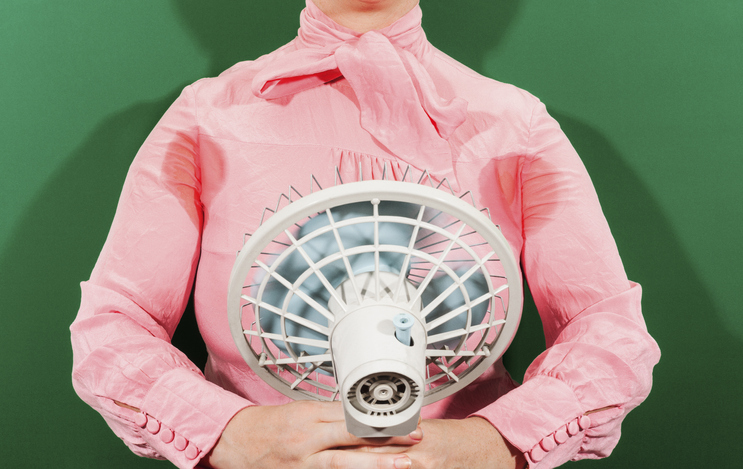Sweat Too Much or Not Enough? Perhaps It's Time to Check Your Diet!

By Joy Stephenson-Laws, J.D., Founder
Sweating is one of those things that we probably don’t think much about unless we perspire so much that it begins to affect our quality of life. Or unless we notice our body’s unique odor (yes, we each have our own body scent depending on how the contents of our perspiration interact with the bacteria on our skin) gets us unapproving looks in business meetings or social situations. And for some of us, we don’t pay attention unless we notice that we are as dry as a desert after a run while our jogging partner is soaked.
It turns out, however, that like our blood, our perspiration can give us important information about our health. And in keeping with the adage of “we are what we eat,” our diet and nutritional status can impact both how much (or how little) we sweat and whether we have a benign odor or can clear a room!

Take a closer look and you will see that sweating is, in many ways, a finely tuned system that plays a critical role not only in our health but in staying alive since it keeps our bodies at “just the right temperature.” It also plays a role in helping to regenerate our skin after it suffers an injury as well as helping protect us from infections. Most people are also surprised to learn that we produce two different kinds of sweat, depending on which type of sweat gland is producing it.
Sweat produced by eccrine sweat glands (which are all over our body) tends to be clear, odorless and mostly water. Perspiration produced by our apocrine sweat glands (found in our armpits, chest, forehead and groin) tends to be thicker. There is a third type of sweat gland which has characteristics of both and are known as apoeccrine sweat glands. Even though it is mostly water, sweat also contains small amounts of magnesium, iron, sodium, calcium, and potassium.
What Our Sweat Can Tell Us About Our HealthIf you are sweating a lot even when there is no reason to be doing so (hyperhidrosis), very little or not at all when you should be (anhidrosis), or if your sweat is more pungent than usual, it is possible that your body is trying to tell you something. This is because various conditions can affect how much you sweat and how it smells. So you should listen to what your sweat may be saying! These include:
- Pregnancy and menopause: Changes in hormone levels such as those triggered by menopause or pregnancy can cause a woman to sweat more than she usually does.
- Low blood sugar levels: If you are exercising a lot or if you are diabetic, the glucose levels in your blood may drop below the optimal range and this may cause you to sweat.
- Stress: Unlike the sweat made by eccrine glands to regulate our body temperature, the sweat produced when we are anxious or stressed is produced by the apocrine glands found in areas such as our groin and armpits. And the protein and fat found in this type of milky sweat mixes with the bacteria on our skin, creating an odor.
- Overheated: If you are exerting yourself or are outside on a hot day and you stop sweating, this is a sign that you may be becoming dehydrated and are at risk for heatstroke.
- Diabetes: Can cause damage to the nervous system, which can affect how your sweat glands work. This can cause them to produce too much or too little perspiration.
- Hyperthyroidism: This condition can increase your metabolism, heart rate and body temperature, which can cause you to perspire excessively.
- Parkinson’s Disease: Can affect your autonomic nervous system, which controls sweating.
- Alcoholism: Can trigger night sweats either from the drinking itself or from trying to abruptly quit drinking. Alcohol in general also increases sweat production.
Certain medications such as steroids and antidepressants can also cause you to sweat. Be sure to talk with your doctor or pharmacist about the side effects, including sweating, of any medications you are taking.
Interestingly enough, and almost counterintuitively, sweating when you exercise can also mean that you’re in good shape. One study suggested that fit people tend to sweat sooner and more copiously than those with a more sedentary lifestyle.
And if you are suddenly sweating heavily for no apparent reason, this could be a signal of a serious health condition such as a heart attack. If you have other warning signs of a heart attack, get immediate medical attention.
Food and Sweating
The foods you eat and how your body metabolizes them can impact how much you sweat as well as how fragrant your sweat may be. One important thing you can do if you are sweating too much or too little, or are concerned about how your sweat smells, is to keep a food diary. Then look to see if you have eaten any of these foods around the time you notice changes in the quantity or aroma of your sweat:
Foods that can increase your sweat include:
- Spicy foods, such as peppers, which have a chemical (capsaicin) that makes your body feel warmer
- Acidic foods
- Processed foods
- Foods with high amounts of sugar and/or carbohydrates
- Salty foods
- Fatty foods
- Ice cream
- High-protein foods
- Caffeine and alcohol
If your sweat has a disagreeable smell after eating, then watch out for onions and garlic, both of which can make your perspiration smell of sulfur. It also is possible that your body may not be able to adequately metabolize trimethylamine, which is produced when you eat eggs, fish and legumes. This is caused by a genetic disorder which, luckily, is quite rare.
Other foods can help reduce the amount you sweat. These include:
- Water (helps regulate your body temperature so you will not sweat as much)
- Foods that are high in calcium, such as dairy products, salmon, sardines, lentils, almonds, leafy greens and rhubarb
- Green tea (I recommend decaffeinated)
- Olive oil
- Foods that are high in the B vitamins such as salmon, eggs, legumes organ meats, shellfish and leafy greens
- Fruits and vegetables with high water content such as watermelon, lettuce, oranges, cantaloupe and cucumbers
- Foods that are high in magnesium such as almonds, spinach, pumpkin seeds, avocado and soy
If you still smoke, I also highly recommend that you quit. In addition to its other health benefits when you quit smoking, it can also reduce how much you sweat since nicotine can make your sweat glands work overtime.
Enjoy your healthy life!
The pH professional health care team includes recognized experts from a variety of health care and related disciplines, including physicians, attorneys, nutritionists, nurses, and certified fitness instructors. This team also includes the members of the pH Medical Advisory Board, which constantly monitors all pH programs, products, and services. To learn more about the pH Medical Advisory Board, click here.







